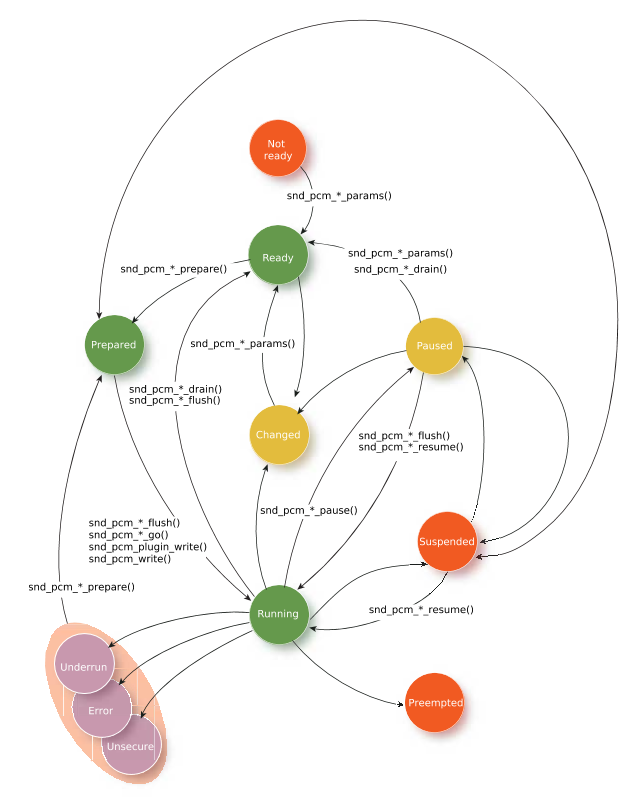Let's consider the state transitions for a PCM device during playback.
 Figure 1. State diagram for PCM devices during playback.
Figure 1. State diagram for PCM devices during playback.In the figure above, the oval groups the Underrun, Error, and Unsecure states together to indicate that each state can transition to the Prepared state
The transition between SND_PCM_STATUS_* states is the result of executing an API call, or the result of conditions that occur in the hardware:
| From | To | Cause |
|---|---|---|
| NOTREADY | READY | Calling snd_pcm_channel_params() or snd_pcm_plugin_params() |
| READY | PREPARED | Calling snd_pcm_channel_prepare(), snd_pcm_playback_prepare(), or snd_pcm_plugin_prepare() |
| PREPARED | RUNNING | Calling snd_pcm_channel_flush(), snd_pcm_playback_flush(), snd_pcm_plugin_flush(), snd_pcm_playback_go(), snd_pcm_channel_go(), snd_pcm_write() or snd_pcm_plugin_write() |
| PREPARED | SUSPENDED | When forced ducking is enabled via a call to snd_pcm_channel_audio_ducking(), the state change occurs when the audio concurrency management policy in place has ducked the audio stream that's currently in the PREPARED (SND_PCM_STATUS_PREPARED) state. If forced ducking isn't enabled, this state change doesn't occur. |
| RUNNING | PAUSED | Calling snd_pcm_channel_pause() or snd_pcm_playback_pause() |
| PAUSED | RUNNING | Calling snd_pcm_channel_flush(), snd_pcm_playback_flush(), snd_pcm_plugin_flush(), snd_pcm_channel_resume() or snd_pcm_playback_resume() |
| PAUSED | SUSPENDED | While the subchannel was paused, a higher priority or same priority subchannel preempted the paused subchannel (volume was ducked to zero). For that reason, the stream moves to the suspended (SND_PCM_STATUS_SUSPENDED) state. |
| PAUSED | READY | One of the following:
|
| RUNNING | READY | One of the following:
|
| RUNNING | UNDERRUN | The hardware buffer became empty during playback |
| RUNNING | UNSECURE | The application marked the stream as protected, the hardware level supports a secure transport (e.g., HDCP for HDMI), and authentication was lost |
| RUNNING | CHANGED | The stream parameters have changed |
| RUNNING | ERROR | A hardware error occurred |
| RUNNING | SUSPENDED | Audio concurrency management has suspended the subchannel because a higher or same priority subchannel has run. |
| SUSPENDED | RUNNING | Audio
concurrency management has moved the previously suspended subchannel back to the
running (SND_PCM_STATUS_RUNNING) state and the subchannel starts to
play again. The application must start writing data, otherwise an underrun condition
can occur. This transition may also occur if a subchannel is in a soft suspended (SND_PCM_STATUS_SUSPENDED) state and calls snd_pcm_channel_resume() or snd_pcm_playback_resume(). For more information, see “Understanding preemption” section in the Audio Concurrency Management chapter of this guide. |
| SUSPENDED | PAUSED | The state occurred because the audio concurrency management policy in
place is configured to pause, which means when audio concurrency management
clears the suspension, a transition was made to the PAUSED
(SND_PCM_STATUS_PAUSED) state rather the RUNNING
(SND_PCM_STATUS_RUNNING) state. If you were previously in the PAUSED state before the suspension occurs, after suspension is lifted, you return to the PAUSED state. While in the SUSPENDED state, if a snd_pcm_*_pause() call was made, you would transition to the PAUSED state when the suspension is lifted. |
| SUSPENDED | PREPARED | If forced ducking was enabled via a call to snd_pcm_channel_audio_ducking(), then audio concurrency management changes from the SUSPENDED state to the PREPARED (SND_PCM_STATUS_PREPARED) when the suspension condition has been lifted. |
| SUSPENDED | READY | While the subchannel was suspended, if you call snd_pcm_*_drain(), the stream moves to the READY state. |
| UNDERRUN, UNSECURE, or ERROR | PREPARED | Calling snd_pcm_channel_prepare(), snd_pcm_playback_prepare(), or snd_pcm_plugin_prepare() |
| RUNNING | PREEMPTED | Audio is blocked because another libasound session has initiated playback, but there aren't enough system resources available; the audio driver has determined that the new session has higher priority and as a result, this session has been preempted. |
For more details on these transitions, see the description of each function in the Audio Library chapter.